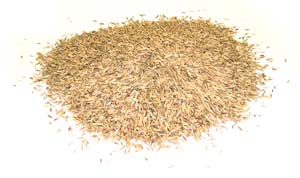Many homeowners purchase grass seed based on price or by recognized brand. This assumes all grass seed varieties are the same. We know this is not true. Because of this, our breeders work to create a superior grass seed. They breed for deeper green color, tolerance to drought conditions, disease resistance, resistance to insects, and the ability to withstand heavy foot traffic. Over 30 new varieties are introduced each year.

All GreenView Fairway Formula Grass Seed Mixtures and Blends contain only 100% top rated varieties of cool season grasses. Other mixtures or blends may contain one or two top rated seeds making up a small portion of the total mix.
The most important factor in selecting turfgrass seed for your site is which species (or mix of species) best fits your climate, site use, and intended maintenance level. This is important whether you are deciding on the initial selection for athletic fields, home lawns, or commercial sites; or renovating your existing turf to add newer improved varieties to the turfgrass population. As the cost of the seed is a very small portion of the total cost of any seeding job, be sure to choose the best seed varieties available that fit your site requirements.
More information about cool-season grass types is available here »
Grass seed ratings — NTEP
There is an easy way to find out which grass seed varieties are best. An independent organization (NTEP) tests and evaluates each variety every year. This is the secret known to professionals that enables them to have the great lawns, golf courses, and playing fields we admire.
The National Turf Evaluation Program (NTEP) is a self-supporting, non-profit joint effort of the National Turfgrass Federation and the U.S. Department of Agriculture (USDA). NTEP receives grass seed varieties from numerous manufacturers. The seeds are tested in as many as 46 locations across the United States and Canada. The seeds are planted, monitored and rated on a yearly basis.
At the end of a 5-year testing period a final rating is published. Ratings are based on color, disease resistance, insect resistance, and drought resistance, ability to withstand traffic, leaf texture, density, heat tolerance, cold tolerance, and overall turfgrass quality. Furthermore, you can find out which varieties of a particular species ranked the highest nationally and at locations near you. To learn more about turf evaluation program features and variety results visit www.ntep.org.
However, since the NTEP tests operate on a five year rotation, ask about newly released varieties that may be available, especially if they are in the later years of that species NTEP test rotation. Great improvements can be made during that time and data from research universities may be available for these new varieties.
Local factors to keep in mind when choosing a grass seed variety
Your choice of grass seed will depend on the following.
- What are the conditions, sunny, shady (less than 6 hours of sun per day) or a mix of the two?
- What is the geographical location? North, south, transition zone (middle third of the U.S.).
- Is there a species that is better for the location than others? Most grass seed producers select the appropriate species for a location or there may be a preference for certain species, for example a Kentucky Bluegrass lawn.
- Next there are varieties to consider. Which ones will be better suited to the environment and conditions of a specific lawn?
Compare the charts of grass properties of warm season grasses and cool season grasses.
Species vs. variety
Species refers to the type of grass, for example Kentucky Bluegrass, Perennial Ryegrass, Tall Fescue. The variety is a type of species, for example Charismatic and Exacta are both varieties of Perennial Ryegrass.
Mixtures vs. blends
A mixture consists of different species of grass seed and may contain more than one variety of a species.
A blend consists of one species with several varieties. Selecting a blend is better than selecting a single variety since each variety has strengths and weaknesses. For example one variety may have great drought resistance and one might have better insect resistance. This will provide a better chance of the lawn surviving different conditions.
Weeds in grass seed
Most of the weeds growing in lawns were already there when the seed was planted. All GreenView Fairway Formula Grass Seed mixtures and blends are 99.9% weed free.